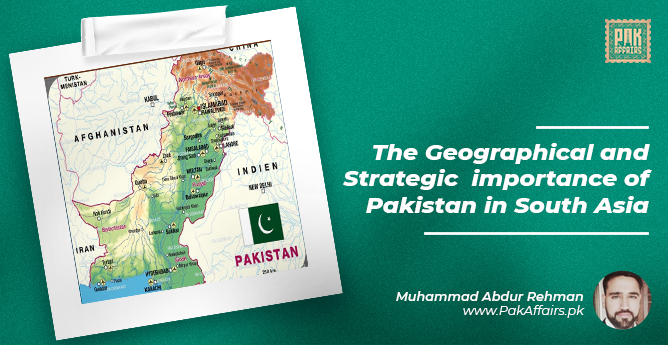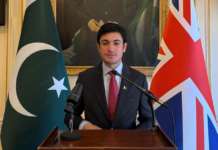
Pakistan is a key player in the dynamic and crucial region of South Asia. It has an essential geographical and strategic position in the region, especially in South Asia. The region remains to be crucial for all the major powers of the current international politics. Pakistan shares borders with India, Afghanistan, and Iran. The geography of Pakistan has made it an apple of major powers’ eyes for fulfilment of their strategic interests in the South Asian region. This is so for many reasons: The country has dynamic terrains of land, deserts, mountain ranges, rivers and coastal areas. It is important for defence reasons and for economic reasons and trade. In future, tourism may play a more important role, too.
In the South Asian region, there are two important actors which influence regional politics, notably India and Pakistan, much due to their nuclear capability. Throughout their 70-year history as separate states, India and Pakistan have had tense relations. Both states stood head to head in wars four times since their inception due to ideological and territorial tussles. The acquirement of nuclear capability has further infuriated the sustainable situation in the South Asian region and put the regional peace at stake. Yet, it may also be a stabilizing factor. At Pakistan’s Western borders with Afghanistan, there has been tension, and it has remained a hub of insurgency for decades. Afghan Jihad and later on the commencement of the so-called War on Terror have weakened the state structure of Afghanistan.
In spite of the above-mentioned geo-strategic challenges, Pakistan retains an influential position in the region, much due to it serving the interests of the major powers. China has signed a quite astonishing deal with Pakistan in 2014 for its Belt and Road (BRI) Initiative of connectivity. The overwhelming China-Pakistan Economic Corridor (CPEC) projects are worth billions, with long-lasting impacts on the geo-political and geo-economic aspect of the region. It not only opens the avenues of trade, development and other activities, but also strengthens Pakistan’s position in the South Asian region. With the completion of the CPEC large number of projects, China will find the shortest route for its exports and trade towards the Middle East and rest of the world through Pakistan.
Strategically, another positive sign is that the USA is seeking a major role for Pakistan to be able to implement peace deals signed between the Taliban and the US authorities. Pakistan has played an active role in the Doha negotiating peace settlement between the Taliban and the US authorities. It is necessary to mention that the sustainable peace settlement is not only in the interest of the USA to save face and be able to withdraw or reduce its major presence in Afghanistan. How developments go in Afghanistan impacts Pakistan, indeed Pakistan’s border areas.
In a nutshell, it should be noted that Pakistan has an effective role in South Asian regional politics. The geo-strategic location of the country has served it with a comparative edge over other stakeholders of the region. Nonetheless, the complex border situations have also raised gigantic challenges for the country.
Pakistan remains important for both China and the USA. China put its maximum efforts for the completion of its outstanding CPEC projects in order to raise its geo-political and economic interests. China will find the shortest route for its trade and connectivity with the rest of the world. It will also improve the problematic transmission of oil through the South China Sea where China has faced multiple confrontations with the Philippines, Vietnam and Taiwan. China has rapidly emerged as the economic giant in Asia and globally, with the world’s second-largest economy, thus challenging the USA and the West. The shared interest of Pakistan and China facilitates bilateral cooperation and trade.
Recently, Pakistan’s Foreign Minister Shah Mahmood Qureshi went to China on an important two-day visit attending the ‘China-Pakistan Foreign Minister’s Strategic Dialogue’, where he held talks with China’s Foreign Minister Wang Yi. This is evidence of the importance the two countries pay to their cooperation. It is also interesting to note that the former deputy at the Chinese Embassy in Islamabad now shoulders duties as a spokesperson for the Chinese Ministry of Foreign Affair, and has several times appeared on international TV in that role.
Pakistan’s strategic position will continue to be enhanced and it has found firm Chinese support against its arch-rival of India in this respect. However, in respect of Pak-USA relations, both states have shared shaky relations, but for now, the USA needs Pakistan’s support badly in Afghanistan. The USA has used Pakistan’s shoulders in order to secure its national interests, Nonetheless, if the peaceful political settlement is done in Afghanistan, that will also provide a space for Pakistan to re-prioritize its policies regarding border management, and it will help Pakistan to focus its efforts on the major existing problems of development, notably, health, education, infrastructure, employment, development of the remote border areas with Afghanistan, issues related to climate change, and more.
Muhammad Abdur Rehman
The writer is a master scholar in international relation
[email protected]




